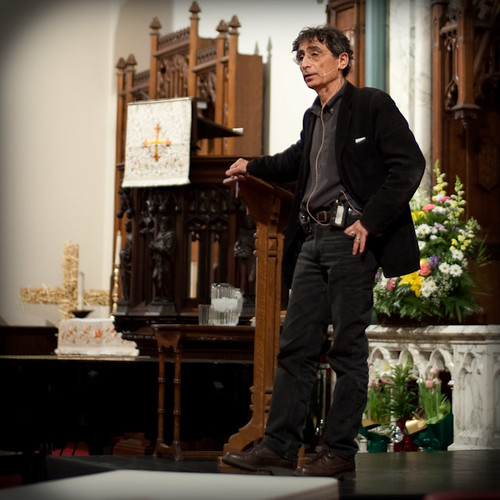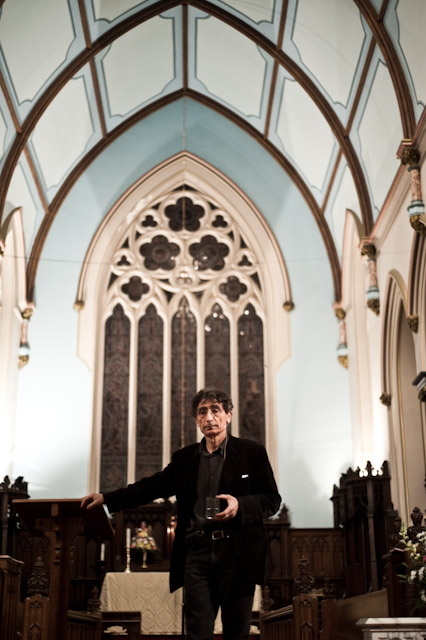Last night I went to see Dr. Gabor Mate talk about “The Four Compassions: A humane community response to addictions” at a local church. He is the staff physician at the Portland Hotel, a residence and resource centre for people of Vancouver’s Downtown Eastside, where he works with patients who suffer from mental illness, drug addiction and HIV, or all three. He’s written a number of books, including The Realm of Hungry Ghosts: Close Encounters with Addiction, which I read last fall.
He is a tremendous speaker. Apparently he only prepared his talk as he arrived, but it was very well-structured, so he obviously gives a lot of talks. I could have listened to him for hours. Way back when, I wanted to talk about his book, but it took me a while to finish, and by the time I did, I’d lost touch with the first half of the book. His talk last night was a great refresher.
He believes that the basic, instinctual response of humans is compassion, unless experience shuts that response down. The four compassions are:
1. acknowledging the suffering of other people
2. understanding, and a drive to find out what’s behind the suffering
3. recognizing ourselves in others’ suffering
4. possibility, transformation
He also said that even referring to someone as an addict diminishes our understanding, because that is not what or who they are. They are human beings in deep suffering. He talked about InSite, the safe injection facility in Vancouver where people get clean needles and rubbing alcohol, and if they overdose, health professionals are there to revive them. He mentioned the RCMP head’s official stance on reviving people from overdoses, which is that it shouldn’t be done since it sends a message that it’s ok to use drugs. Dr. Mate said he couldn’t fault the logic of that, but if we’re going to take that stance, the entire medical system should take it, so that the workaholics who have heart attacks don’t receive bypass surgery, and the smokers don’t get antibiotics for their bronchitis. Which is just inhumane, of course.
He talked about how judgment hurts all of us, because it separates us into us and them, and denies the unity of human beings. He also said that if we find ourselves making judgments we shouldn’t feel too bad about it, because the human brain is wired to make judgments all the time. We’re just there. But the trouble comes when we believe the judgments. So the trick is just to observe the judgments without becoming attached to them. He also said we judge most harshly the things we are ashamed of in ourselves. So to serve his patients compassionately he needs to take care to deal with his own addictions (workaholism and compulsive cd shopping) so he doesn’t lash out in shame.
In the Q’s and A’s after his speech, he said that he believes nobody is beyond help. If a person is alive, then their soul is alive, and the soul is infinite possibility. He also talked about recovery, how the word recover means to find again, and you can’t find something again if it wasn’t there in the first place. What people find again when they recover is themselves, their wholeness, their infinite possibility. To do that, they need confidence, some hope of victory. And our judicial and medical systems don’t nurture that hope at all.
He ended the night answering a question about parents who let their kids cry it out to train them to sleep. Essentially, he said it wasn’t good for the child’s emotional wellbeing, even though explicit memory doesn’t begin until after age 2. But the practice teaches kids that the world is an indifferent place. He said it isn’t the child’s problem that our world requires both parents to work full-time. Now, I pretty much agree with him, to a point. And it wasn’t something that we were able to do. However, I also bristle at anything that smacks of prescribing what a mother should or shouldn’t do. Fortunately, I have the benefit of having read his book, and he did advocate that our culture needs to support mothers and families much better than it currently does. Because early experiences have such influence over a person’s brain development and later wellbeing, a mother’s job is quite literally the most important task there is. But if I hadn’t read the book, I might have left the church all set to ream somebody out for doing what they think is best for their family.
That said, I’m so glad I went to hear him speak. And I enjoyed the irony of hearing him critique certain Christian approaches up at the pulpit.
I will leave you with my memory of something he quoted at least a few times through the night:
“Do not pay attention to the things that others do or fail to do. Only pay attention to the things that you do or fail to do.”

